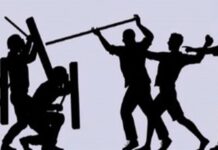‘When people forget the incident a few days later, they are back to doing the same job. To prevent these incidents from recurring, we need exemplary punishment’
Inspector Moinul Islam, who is now attached to Chittagong Metropolitan Police (CMP) Lines, was closed after he was accused of getting drunk and physically assaulting a sub-inspector of Double Mooring police station and five employees of the Hotel Saint Martin in the city’s Agrabad area on July 4. Following the incident, CMP formed a committee to investigate the matter.
CMP Commissioner Iqbal Bahar says several allegations brought against Inspector Moinul were found true and he would advise the Police Headquarters to take action against him.
“The probe report will be sent to the headquarters and an additional inspector general of police will further investigate the incident,” he told the Dhaka Tribune.
Meanwhile, officials of Khalishpur police station in Khulna are accused of gouging out the eyes of a detainee for not paying a bribe. The detainee, Shahjalal, is currently undergoing treatment at Dhaka Medical College Hospital. The station refutes the allegation, saying that a mob in Khulna city did this to the man when he was caught hijacking. OC Nasim Khan says police merely arrived in time and rescued the man.
“Ten minutes late and we would have found him dead,” he says.
Thousands of allegations of crime and indiscipline are filed against police personnel every year, both in the courts and within the department.
We have always said that structural changes in police are needed, especially at the station level where there is a massive workload on policemen. For this reason, they need internal training on behaviour
and job responsibility
A scrutiny of the numbers provided by Police Headquarters shows that the conviction rate in criminal cases against police are low, however a large number of departmental actions are taken against errant police officials.
Police authorities say they investigate and punish wrongdoing within the force diligently and this has increased accountability in the force. However, the numbers do not show any significant decline.
According to the Police Headquarters, 721 criminal cases were filed against 798 police members in the last five years. The number of cases has remained almost the same in these five years. In 2016, 128 cases were filed and in 2012, it was 129.
A majority of the cases are filed against police officials of ranks between constable and sub-inspector.
Another statistics shows that the police have taken 67,039 disciplinary actions against their errant members. About 4-7% of these are major punishments, which include forced retirement and dismissal.
In total, 517 people have been fired and 36 sent to forced retirement in five years.
The rest were minor punishments, such as suspension, demotion, salary cuts, reproof notices and transfers.
However, year-to-year figures show that departmental cases have not declined either. The number of punishments were the highest in 2014 at 15,297 and lowest in 2015 at 11,167. In 2016, it went up again to 13,503.
The police force currently has about 180,000 members, which means on any given year, 6-8% of the force is facing some kind of disciplinary action.
Inspector General of Police (IGP) AKM Shahidul Haque has said on many occasions that the authorities do not make light of any allegations against any police member, and the entire force cannot be held responsible for its deviant members.
The IGP has also spoken out on many occasions against use of excessive force or violence by police and said that such behaviour will not be tolerated.
Human rights activist Nur Khan, a former executive director of Ain o Salish Kendra (ASK), told the Dhaka Tribune that police professionalism and chain of command breaks down when police are used for political gains.
“This is what leads to selfishness and the moment when police stop being the servant of the people and become the oppressor,” he said.
“To rid ourselves of this plague, we need to be able to exercise what little provision there is. Police need to ensure that there is an internal monitoring agency to scrutinise complaints against them. The investigation should also involve magistrates,” the activist said.
He also suggested that a permanent commission be set up in this regard.
“They will look into the serious allegations against police and provide the government with necessary advice. This should prevent a lot of the illicit activities and misuse of power by police,” he said.
Human rights activist Alina Khan believes police’s internal actions are merely eyewash.
“When people forget the incident a few days later, they are back to doing the same job. To prevent these incidents from recurring, we need exemplary punishment,” she said.
The crimes persist because police members put their personal interests first and do not have a sense of belonging in the institution, she said.
“They do not love their organisation. If they did, these things would not happen,” she added.
Dr Jia Rahman, professor of criminology at Dhaka University, says that economic transformation of the society has created many opportunities to engage in crime.
“Under these circumstances, if police do not undergo massive reform, people will not get necessary service from them,” he said.
“We have always said that structural changes in police are needed, especially at the station level where there is a massive workload on policemen. For this reason, they need internal training on behaviour and job responsibility,” he said.
Although police have transparency, it is not enough, he said. He also urged the public to protest police crimes and play a more important role in the media.
Sahely Ferdous, assistant inspector general (media and publication) of the Police Headquarters told the Dhaka Tribune: “When we get any allegation against the police, first we investigate it. If we find any authenticity to the claims, we take action against them.”
Police also undertake criminal prosecutions against serious offenders, she added.
Source: Dhaka Tribune











